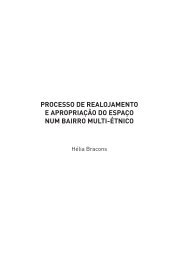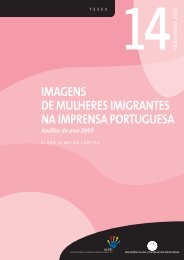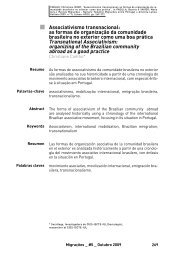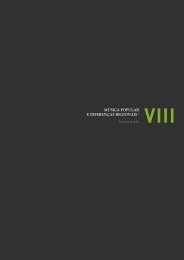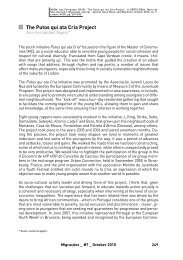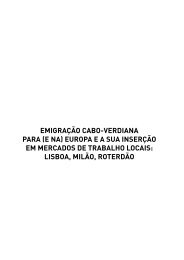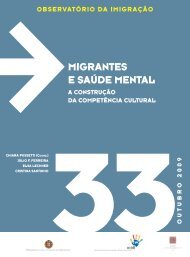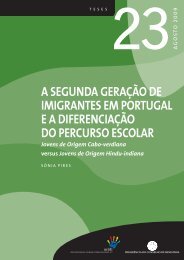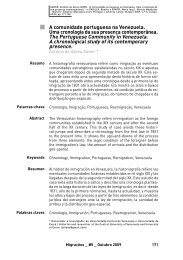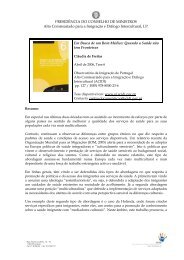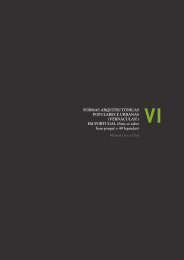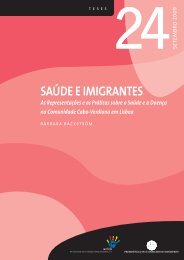mechanistic-determ<strong>in</strong>ist perspective (Fonseca, 2008:16) to what may be called <strong>the</strong>performative-diversifiable perspective <strong>of</strong> <strong>the</strong> character or identity. Us<strong>in</strong>g <strong>the</strong> image<strong>of</strong> Zygmunt Bauman, <strong>the</strong>y were recognis<strong>in</strong>g <strong>the</strong>n, <strong>in</strong> <strong>the</strong>ir <strong>in</strong>terpretation, <strong>the</strong> passage<strong>of</strong> identity, <strong>in</strong> <strong>in</strong>dividual <strong>and</strong> national grounds, from <strong>the</strong> pilgrim phase, previouslydeterm<strong>in</strong>ed, to that <strong>of</strong> <strong>the</strong> tourist <strong>in</strong> an open <strong>and</strong> fluid state (1996). The power <strong>of</strong> presentbody behaviour <strong>in</strong> performance had surpassed that <strong>of</strong> rationalised nationalistmemory. Nationalist reasons were still dom<strong>in</strong>ant <strong>in</strong> <strong>the</strong> <strong>fado</strong> culture <strong>in</strong> <strong>the</strong> migrantcontext, <strong>and</strong> <strong>the</strong> political sides <strong>of</strong> right <strong>and</strong> left w<strong>in</strong>gs prevailed <strong>in</strong> <strong>the</strong>ir m<strong>in</strong>ds.Older than <strong>the</strong> dictatorship <strong>the</strong> music category <strong>of</strong> <strong>fado</strong>, shaped as a national design,fitted extraord<strong>in</strong>arily well <strong>the</strong> nationalist purposes <strong>of</strong> Estado Novo (New State). Strongcircumstantial conditions, like state control, enhanced <strong>the</strong> dictatorial use <strong>of</strong> <strong>fado</strong>: <strong>the</strong>romantic orig<strong>in</strong>, <strong>the</strong> connection with dest<strong>in</strong>y <strong>and</strong> <strong>the</strong> perform<strong>in</strong>g character. Apparentlyborn <strong>in</strong> <strong>the</strong> 19 th century, <strong>in</strong> a time <strong>of</strong> exacerbated nationalist feel<strong>in</strong>gs, it was consistentlyconstructed out <strong>of</strong> a number <strong>of</strong> features that served well <strong>the</strong> also nationalist proposals<strong>of</strong> <strong>the</strong> dictatorship. Its conspicuousness <strong>in</strong> worship<strong>in</strong>g past times <strong>and</strong> homel<strong>and</strong>virtues, giv<strong>in</strong>g voice to <strong>the</strong> people, lean<strong>in</strong>g on unrequited love <strong>of</strong> different sorts, nurturednostalgic feel<strong>in</strong>gs such as sorrow <strong>and</strong> yearn<strong>in</strong>g. The latter serv<strong>in</strong>g so well <strong>the</strong> contemporarymystic <strong>of</strong> saudade, one <strong>of</strong> <strong>the</strong> virtual images <strong>of</strong> <strong>the</strong> complex affective nodePortuguese people have constructed about <strong>the</strong>mselves through time (Moreira de Sá,nd:1), was shaped not only <strong>in</strong> music but also <strong>in</strong> literature, <strong>the</strong>atre, film <strong>and</strong> o<strong>the</strong>r artworks, produc<strong>in</strong>g multiple referential connections for later symbolic <strong>in</strong>terpretation.The dest<strong>in</strong>y or fate <strong>in</strong> <strong>the</strong> name, acted as an exceptionally strong representation <strong>in</strong>a <strong>the</strong>n mostly illiterate country dom<strong>in</strong>ated by religious faith <strong>and</strong> fears <strong>of</strong> Roman Catholic<strong>in</strong>spiration. F<strong>in</strong>ally, its perform<strong>in</strong>g character giv<strong>in</strong>g voice to <strong>in</strong>timate feel<strong>in</strong>gs <strong>of</strong>many sorts, comb<strong>in</strong>ed with <strong>the</strong> previous conditions, made <strong>fado</strong> an extremely efficientchannel to l<strong>in</strong>k <strong>in</strong>dividual <strong>identities</strong> to <strong>the</strong> national conscience constructed.Concerted actions <strong>and</strong> strategies <strong>of</strong> dictatorial <strong>in</strong>itiative, adapt<strong>in</strong>g <strong>fado</strong> to its purposes<strong>in</strong>cluded stripp<strong>in</strong>g <strong>the</strong> lyrics <strong>of</strong> any possible k<strong>in</strong>ds <strong>of</strong> critical feel<strong>in</strong>gs, through means<strong>of</strong> censorship; promot<strong>in</strong>g <strong>the</strong> taste for <strong>fado</strong>, jo<strong>in</strong><strong>in</strong>g <strong>the</strong> leader, Salazar, <strong>in</strong> its advocacy,through <strong>in</strong>formation as to his preference <strong>and</strong> proximity to it (Garnier, 1952); <strong>and</strong>mak<strong>in</strong>g it a privileged means for national propag<strong>and</strong>a through <strong>the</strong> re<strong>in</strong>forcement <strong>of</strong><strong>the</strong> music category <strong>in</strong> <strong>the</strong> enterta<strong>in</strong>ment <strong>in</strong>dustry (radio, record<strong>in</strong>gs, journals, c<strong>in</strong>ema,music <strong>the</strong>atre, restaurants for tourists <strong>and</strong> <strong>in</strong>ternational diplomatic enterta<strong>in</strong>ment<strong>and</strong> representation). The great diva Amália Rodrigues stressed her own forcedma<strong>in</strong>tenance <strong>in</strong> <strong>fado</strong> activity by what she verbalized as “…[<strong>the</strong>y] wanted me for <strong>fado</strong>”,leav<strong>in</strong>g unsaid whom. She was <strong>the</strong>n mention<strong>in</strong>g <strong>the</strong> power <strong>of</strong> <strong>the</strong> nation, leav<strong>in</strong>g openwho “wanted” her for that: precise government agents? Ambivalent forces? People’swill channelled through nationalist means? (personal <strong>in</strong>terview, Lisbon, 28.08.1990,<strong>in</strong> Côrte-Real, 2005).Even <strong>the</strong> stress on <strong>the</strong> m<strong>in</strong>or tonality associated with <strong>fado</strong>, <strong>and</strong> <strong>the</strong> prevalence <strong>of</strong><strong>the</strong> image <strong>of</strong> <strong>the</strong> <strong>fado</strong> menor category/music pattern was object <strong>of</strong> governmental action.Processed, among o<strong>the</strong>r means, through consecutive <strong>fado</strong> contests <strong>of</strong> nationalscope,<strong>in</strong>volv<strong>in</strong>g most if not all licensed <strong>fado</strong> houses, <strong>in</strong> <strong>the</strong> so called April Festivities(Côrte-Real, 2000, 2002 <strong>and</strong> 2008). For tourist propag<strong>and</strong>a, <strong>the</strong>se events happened84 Music <strong>and</strong> Migration
<strong>in</strong> <strong>the</strong> festive venue <strong>of</strong> <strong>the</strong> water mirror restaurant, still exist<strong>in</strong>g today close by Praçado Império <strong>in</strong> Lisbon. Curiously enough, <strong>the</strong> w<strong>in</strong>ner <strong>of</strong> <strong>the</strong> last Concurso de FadoAmador (Amateur Fado Contest), a young pre-teenager girl, was accepted for <strong>the</strong>competition on <strong>the</strong> very day <strong>of</strong> <strong>the</strong> Revolução dos Cravos (Carnation’s Revolution) -25.04.1974. 12 Also curious is <strong>the</strong> fact that <strong>the</strong> <strong>in</strong>tervention song Grândola Vila Morena,by José Afonso, used as <strong>the</strong> radio signal – on Rádio Renascença – to launch militaryaction was chosen by one <strong>of</strong> <strong>the</strong> f<strong>in</strong>al c<strong>and</strong>idates, <strong>and</strong> accepted by <strong>the</strong> jury, to representhis entry <strong>in</strong> <strong>the</strong> compulsory <strong>fado</strong> menor category (Côrte-Real, 2000:408).The political action used to shape <strong>the</strong> national conscience through <strong>fado</strong> was so effectivethat <strong>the</strong> results last for long after <strong>the</strong> fall <strong>of</strong> <strong>the</strong> regime. Salazar’s propag<strong>and</strong>astressed that <strong>the</strong> spirit shapes <strong>and</strong> transforms men more pr<strong>of</strong>oundly than <strong>the</strong> force <strong>of</strong>dom<strong>in</strong>ators (Garnier, 1955:222). The policy for <strong>the</strong> national revolution, as <strong>the</strong> governmentcalled <strong>the</strong> revolution <strong>of</strong> 28.05.1926 was pursued on spiritual educational grounds<strong>and</strong> presented as “<strong>the</strong> holy war <strong>in</strong> advocacy <strong>of</strong> human liberty, <strong>of</strong> homes (lares) <strong>and</strong>shr<strong>in</strong>es (altares)” (Caetano, 1941:123 <strong>in</strong> Côrte-Real, 2000:28).The development <strong>of</strong> Portuguese society, <strong>in</strong> its different doma<strong>in</strong>s, was dom<strong>in</strong>ated bynationalism, used as a unify<strong>in</strong>g identity force. Extremely elaborate processes <strong>of</strong> culturalconstruction were developed to build products such as “national conscience”,“national family” (Ferro, 1946:II), “national gastronomy”, “national folklore” <strong>and</strong> “nationalsong”. The mono-cultural configuration <strong>of</strong> society was carefully constructedthrough diversified political strategies. The <strong>in</strong>formation <strong>of</strong> cultural, artistic <strong>and</strong> leisurenationalist identity was carefully transmitted across <strong>the</strong> national metropolitan territory,colonies <strong>and</strong> migrant communities through tools such as different periodicals<strong>and</strong>, among o<strong>the</strong>rs, <strong>the</strong> book Portugal: Breviário da Pátria para Portugueses Ausentes(Portugal: Fa<strong>the</strong>rl<strong>and</strong> Book for Absent Portuguese) by SNI (1946), or Vacancesavec Salazar (Holidays with Salazar) by Garnier(1952). The important media channels<strong>of</strong> <strong>the</strong> phonograph <strong>in</strong>dustry, <strong>in</strong>clud<strong>in</strong>g radio <strong>and</strong> television, meanwhile massmediated,<strong>of</strong> difficult access until recently, are now be<strong>in</strong>g object <strong>of</strong> study <strong>and</strong> gradualarchive availability, reveal<strong>in</strong>g recent history.With <strong>the</strong> advent <strong>of</strong> democracy, <strong>in</strong> progress, <strong>the</strong> trends develop slowly towards amore multicultural configuration. The new Constitution <strong>of</strong> <strong>the</strong> Portuguese Republic(1976) proclaimed <strong>in</strong> article 73 “<strong>the</strong> democratization <strong>of</strong> culture”. In its last (7 th ) revision(2005) <strong>the</strong> text <strong>of</strong> <strong>the</strong> article referent to education, culture <strong>and</strong> science states“<strong>the</strong> democratization <strong>of</strong> culture by encourag<strong>in</strong>g <strong>and</strong> ensur<strong>in</strong>g access by all citizensto cultural enjoyment <strong>and</strong> creation”. 13 This measure contrasts with <strong>the</strong> old dictatorialconstitutional policy <strong>of</strong> Estado Novo (1933) that stressed “<strong>the</strong> observance <strong>of</strong> <strong>the</strong> hierarchy<strong>and</strong> coord<strong>in</strong>ation <strong>of</strong> <strong>the</strong> state <strong>in</strong> <strong>the</strong> doma<strong>in</strong> <strong>of</strong> arts <strong>and</strong> sciences” (Article 43, 2<strong>in</strong> Côrte-Real, 2000:15).The dictatorial construct <strong>of</strong> <strong>the</strong> nation, conceived out <strong>of</strong> <strong>the</strong> national identity pr<strong>in</strong>ciple,whose primary aim was <strong>the</strong> “subord<strong>in</strong>ation <strong>of</strong> all <strong>in</strong>dividual <strong>in</strong>terests to <strong>the</strong> commonwelfare, to <strong>the</strong> <strong>in</strong>terest <strong>of</strong> <strong>the</strong> Pátria” 14 (Salazar, 1961:227) developed a tight system<strong>of</strong> social organisation – <strong>the</strong> corporatism. Accord<strong>in</strong>g to its followers, <strong>the</strong> corporativesystem, a solution <strong>of</strong> social <strong>and</strong> moral order, recognised <strong>the</strong> various human societiesMigrações _ #7 _ October 201085



